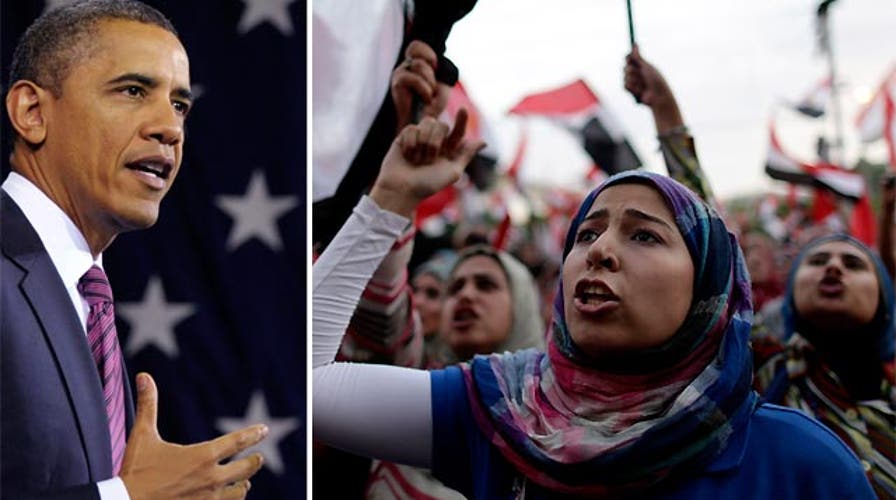The Pentagon finds itself in an awkward position as Egypt's military confronts President Mohammed Morsi amid protests roiling the nation -- after having spent the post-Mubarak period building ties with the generals who could challenge Morsi's legitimacy.
Those ties were forged decades before when the U.S. began providing $1.3 billion a year in foreign military sales and aid to the Egyptian government, after it signed the first peace deal with Israel. It has been the second-largest recipient of U.S. aid since 1979.
The Obama administration as a whole is reluctant to get in the middle of the ongoing power struggle, for fear of giving a wink and a nod to a possible coup. The rumor mill is already rife with suggestions since the Egyptian military's initial 48-hour ultimatum to Morsi followed a conversation between Joint Chiefs Chairman Gen. Martin Dempsey and his Egyptian counterpart.
The Egyptian military said Tuesday it did not have a "coup policy," but was in a tense stand-off with Morsi after he rejected their ultimatum that he address political demands within a two-day window.
President Obama, at the end of his Africa trip in Tanzania, said Monday that America's "commitment to Egypt has never been around any particular individual or party" but to a "process."
"It's not our job to choose who Egypt's leaders are. We do want to make sure all the voices were heard, and it is done in a peaceful way," Obama said.
State Department spokeswoman Jen Psaki also pushed back on reports that Obama pressed Morsi to call for early elections, calling those reports "inaccurate."
Throughout the turmoil, though, the Pentagon has issued few public statements.
"The U.S. is broadly looking for a peaceful end to this tension," Pentagon spokesman George Little told reporters, while refusing to give any readouts of any phone calls placed by U.S. officials or military commanders to Egypt's leaders.
The reality is that the Pentagon has continued to help the Egyptian military since the fall of Hosni Mubarak, providing $1.3 billion of mostly M1 Abrams tanks and some F-16 fighter jets. The U.S. has been providing this type of aid to Egypt since 1979.
Few want a return to military rule in Egypt -- yet the Muslim Brotherhood-aligned Morsi has also encountered plenty of criticism from the West.
Some analysts say this a case where U.S. foreign military sales actually worked -- empowering the Egyptian military to stand up to Morsi and the Muslim Brotherhood, as the people's outrage pushes Morsi toward the door. It also gives U.S. officials leverage as it seeks to prevent a coup or the imposition of martial law.
Michael Meunier, one of the Egyptian opposition leaders and the head of Al Haya political party, said the military aid is a "good thing," saying the military is the "one place" that hasn't been "infiltrated by the Islamists."
He claimed the "only thing" Obama can do is "call on Morsi to relinquish power and to leave Egypt in peace." He added: "The Pentagon needs to understand that there is no way to force Morsi to leave without having the military stand by the people."
But Psaki stressed Tuesday that "we are not taking sides here in this case and it is not up to us, the United States, to make choices here."
Dalibor Rohac, an economist with the Cato Institute, disputed the value of U.S. military aid.
"It's not clear to me what if anything that aid has (bought) us in the past. If we are going to use that aid to exercise leverage over the Egyptian government now, why has the American government not been quite (able) to do that in the past?" Rohac said.
For now, it's unclear where the protests will lead. Three government spokesmen reportedly have quit the Morsi government, as the military's deadline for action approaches. If the military takes over again, there could be another backlash.
Dempsey spoke to his Egyptian counterpart just prior to the military releasing its 48-hour ultimatum on Monday.
The Egyptian military said in a statement: "The Armed Forces put everyone on notice that if the demands of the people are not realized in the given time period, it will be obliged by its patriotic and historic responsibilities and by its respect for the demands of the great Egyptian people to announce a road map for the future and the steps for overseeing its implementation."
The military clarified its message after meeting Morsi on Monday.
"The beliefs and the culture of the Armed Forces do not allow pursuit of a 'coup' policy," the military said, adding the military acts only "with the will of the great Egyptian people and their ambitions towards change and reform."





